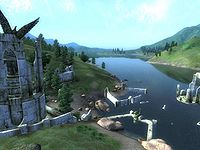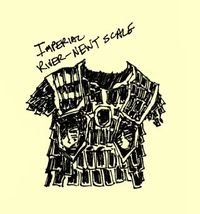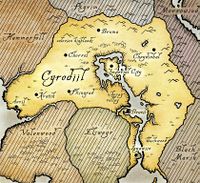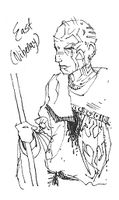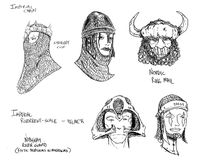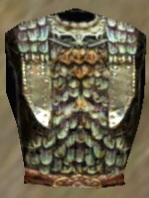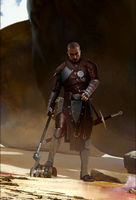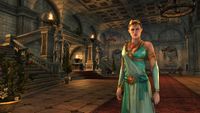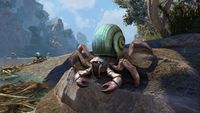Lore:Nibenay
This article is about the cultural-political area. For the western geographical region, see Nibenay Valley. For the eastern geographical region, see Nibenay Basin.
| Nibenay | |
|---|---|
| Type | Region |
| Continent | Tamriel |
| Province | Cyrodiil |
| Demonym(s) | Nibenean, Nibenese |
| Appears in | Oblivion, ESO |
Nibenay, also knows as the Nibenean East,[1] is the eastern part of Cyrodiil and is the traditional heart of the Empire, comprising the modern counties of Cheydinhal, Bruma, Bravil and Leyawiin, as well as the Heartlands around City Isle.[2] The Nibenese culture is considered esoteric and philosophical, with focus on elaborate ceremony.[3] Outside of the capital cities, the largest settlements in the region include Caer Suvio and Mir Corrup.[4]
The largest regions in Nibenay are the eponymous Nibenay Valley and Nibenay Basin, the former nominally including the western bank of the Upper Niben from County Bravil to the Heartlands, and the latter encompassing the eastern side of the Upper Niben and its tributaries; the Corbolo, Reed and Silverfish. South of Niben Bay sits the dark swampland of Blackwood, largely synonymous with the county of Leyawiin. The far northern and eastern parts of the region give way to the Jerall and Valus mountain ranges, respectively. The Jerall city of Bruma, though Nibenese in customs, boasts an architectural style that is more Nordic in design. Similarly, there are aspects of Dunmeri architecture in the eastern city of Cheydinhal.[2]
One of the most notable noble families from Nibenay are the Tharns, who have held estates in and around Cheydinhal since the First Era, and have frequently served directly under the Emperors as ministers and battlemages.[5]
Contents
Culture[edit]
Nibenay is regarded as the soul of Cyrodiil, where the original Cyro-Nordic tribes began to grow culturally and economically separate from Skyrim. Military conflicts of the First Empire of the Nords with mer countries gave rise to an elite form of support troop for the Niben Valley armies, the battlemage. During this time, in opposition to the oppression from the Ayleids, the role of the battlemage was conceived, and these mages went on to become the ruling class of the Nibenese people.[3] By the time the Alessian Doctrines started to spread in Nibenay, the ruling aristocracy of mages were replaced by Alessian priesthood. The Alessian Reformation turned the focus of Eastern productivity towards merchantry, and the Alessian priesthood superseded the battlemages as the cultural leaders.
The traditional Nordic pantheon of Eight Divines was replaced by a baroque veneration of ancestor spirits and god-animals, practices encouraged by the mutable-yet-monotheistic doctrines of the Alessian faith. The impact of the Doctrines on Nibenese culture is hard to overstate: restrictions against certain kinds of meat-eating and the presence of the various animal-cults put taboos on the application of agriculture and husbandry. Many of the Eastern Cyrodiils were forced to become merchants, which, over time, allowed the Nibenay Valley to become the wealthiest city-state in the region. This lasted until the priesthood became too large to support itself, and the Alessian Order collapsed following the resistance of Western Cyrodiil to their doctrines and the subsequent creation of the autonomous Colovian Estates. Nibenay then reverted to its previous battlemage aristocracy, and they have been near the top of Nibenese social standing, right above the merchant nobility, to this day. Modern social hierarchy on Nibenay could be exapmlified by rice field workers, merchant-nobility above them, followed by the temple priests and cult leaders, and the ancient aristocracy of the battlemages on the top, answering only to an emperor.[3]
Fashion[edit]
People of Niben contrasted traditionalistic and pious Colovian culture with bright cloths, tattoos and brandings, inclined to philosophy and the evolution of ancient traditions.[3] The big emphasis on cultural tattoos, expressing religious preferences, political allegencies or simply lifestyles of their bearers, said to made this art of self-expression an integral part of the Nibenese identity.[6]
Religion and Faith[edit]
It is said the Nibenese find the numinous in everything around them, and their different cults are too numerous to mention. The name a few, there are the Cult of the Ancestor-Moth, the Cult of Heroes, the Cult of Tiber Septim, the Cult of Emperor Zero)[3], and the Cult of Reman [7]. Besides there are numerous god-animal cults and cults of ancestors[3], coexisting with the dominant Eight (and later Nine) Divines religion.[8]
Notable Places[edit]
- Bloodmayne Cave
- A cavern at the edge of the Basin sharing flora and fauna with neighboring regions.
- Bravil
- A rundown, squalid town on the west bank of the Niben.
- Cadlew Chapel
- A chapel located on the north bank of the Silverfish River
- Cheydinhal
- A town in eastern Cyrodiil with a large Dunmer population.
- Cropsford
- A settlement located along the Yellow Road in the center of goblin territory, which has historically caused trouble for settlers.
- Fathis Aren's Tower
- A ruined fort along the Green Road south of Bravil.
- Larsius River
- A river running from the border of Elsweyr past Bravil and into Niben Bay.
- Leyawiin
- A Nibenese city in the extreme southeast of the province, by the mouth of the Niben River.
- Malada
- Also called the High Fane, an Ayleid temple known for their distinctive exterior pillar.
- Mir Corrup
- A resort settlement.
- Mountain Watch
- A village of about ten houses near Cheydinhal, inhabited by farmers and hunters in the Fourth Era.
- Nenalata
- One of the last surviving Ayleid city states.
- Niben Bay
- The large lake that forms the outflow from Lake Rumare into Topal Bay.
- Panther River
- A river that snakes through the Nibenay Basin east of Bravil.
- Silverfish River
- A river that flows down from the Valus Mountains into Niben Bay.
- Sundercliff
- A former village and waystation of the Reman Dynasty.
- Vahtacen
- An Ayleid settlement home to the Vahtache, an Ayleid faction.
Gallery[edit]
Notes[edit]
- The Pocket Guide to the Empire, 1st Edition claims that Nibenay has rivers that allow merchants from the Imperial City to connect to friendly inland ports in Skyrim and Pellitine.[3] However, there are no known rivers that extend into those provinces.
References[edit]
- ^ Guide to Cheydinhal — Alessia Ottus
- ^ a b Loading screens in Oblivion
- ^ a b c d e f g Pocket Guide to the Empire, 1st Edition: Cyrodiil — Imperial Geographical Society, 2E 864
- ^ 2920, The Last Year of the First Era — Carlovac Townway
- ^ House Tharn of Nibenay — Count Opius Voteporix
- ^ Lady Eloisse Answers Your Questions — Lady Eloisse, Fifth Countess Manteau
- ^ Chancellor Abnur Tharn Answers Your Questions 2 — Chancellor Abnur Tharn
- ^ Varieties of Faith... — Brother Mikhael Karkuxor of the Imperial College
| ||||||||||||||||||||||||||||||||||||||||||||||||||||||||
| ||||||||||||||
